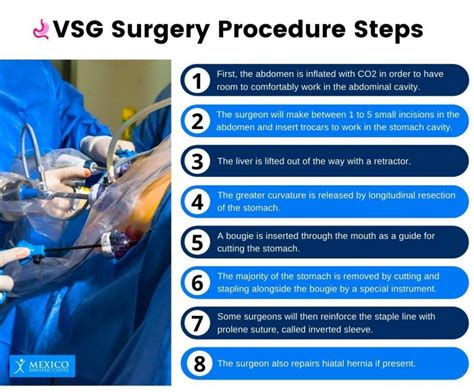Intro
Unlock 5 VSG weight loss tips for a healthier lifestyle, including diet plans, exercise routines, and nutrition advice to boost metabolism and achieve sustainable weight loss results with vertical sleeve gastrectomy.
The Vertical Sleeve Gastrectomy (VSG) is a highly effective weight loss surgery that has helped numerous individuals achieve significant weight reduction and improve their overall health. However, the success of the procedure depends on various factors, including the patient's commitment to lifestyle changes and post-operative care. In this article, we will delve into the world of VSG weight loss, exploring the benefits, challenges, and providing valuable tips to help individuals achieve their weight loss goals.
For those who have undergone VSG surgery, it is essential to understand that the journey to weight loss is not just about the procedure itself, but also about making sustainable lifestyle changes. The VSG surgery works by reducing the size of the stomach, which in turn reduces hunger and increases feelings of fullness. However, to achieve optimal weight loss results, patients must be willing to adopt healthy eating habits, engage in regular physical activity, and attend follow-up appointments with their healthcare provider. By doing so, individuals can maximize the benefits of the VSG surgery and maintain a healthy weight in the long term.
The decision to undergo VSG surgery is a significant one, and it is crucial to approach the journey with a clear understanding of what to expect. The road to weight loss can be challenging, but with the right mindset, support, and guidance, individuals can overcome obstacles and achieve their goals. In the following sections, we will provide in-depth information on VSG weight loss tips, including pre-operative preparation, post-operative care, and strategies for maintaining weight loss in the long term.
Understanding VSG Surgery

Benefits of VSG Surgery
The benefits of VSG surgery are numerous and well-documented. Some of the most significant advantages of the procedure include: * Significant weight loss: VSG surgery can help individuals achieve significant weight loss, with many patients losing 60-80% of their excess weight within the first year. * Improved health: The VSG surgery can help improve overall health, reducing the risk of obesity-related conditions such as diabetes, high blood pressure, and heart disease. * Enhanced quality of life: The VSG surgery can help individuals improve their quality of life, increasing energy levels, improving mobility, and enhancing overall well-being.Pre-Operative Preparation

Medical Tests
Medical tests are an essential part of pre-operative preparation. Patients must undergo a series of tests, including blood work, imaging studies, and cardiac evaluation, to ensure that they are healthy enough for surgery. The tests help identify any underlying medical conditions that may need to be addressed before surgery.Post-Operative Care

Pain Management
Pain management is an essential part of post-operative care. Patients may experience pain, discomfort, and nausea after surgery, which can be managed with medications and other interventions. The goal of pain management is to ensure that patients are comfortable and able to recover quickly and safely.Strategies for Maintaining Weight Loss

Support Systems
Support systems are essential for maintaining weight loss after VSG surgery. Patients must surround themselves with positive and supportive people, including family, friends, and healthcare providers. Support groups can also provide a safe and supportive environment for patients to share their experiences and connect with others who have undergone similar journeys.Common Challenges

Coping Mechanisms
Coping mechanisms are essential for overcoming the challenges associated with VSG surgery. Patients must learn to manage stress effectively, using techniques such as meditation, yoga, or deep breathing exercises. Patients must also surround themselves with positive and supportive people, including family, friends, and healthcare providers.Conclusion and Next Steps

We invite you to share your thoughts and experiences with VSG surgery in the comments section below. If you have any questions or concerns, please do not hesitate to reach out to us. We are committed to providing you with the support and guidance you need to achieve your weight loss goals.
What is VSG surgery?
+VSG surgery, also known as Vertical Sleeve Gastrectomy, is a minimally invasive procedure that involves the removal of a significant portion of the stomach, leaving a narrow sleeve-like stomach.
How much weight can I expect to lose after VSG surgery?
+The amount of weight loss after VSG surgery can vary depending on several factors, including the individual's starting weight, overall health, and commitment to lifestyle changes. On average, patients can expect to lose 60-80% of their excess weight within the first year.
What are the benefits of VSG surgery?
+The benefits of VSG surgery include significant weight loss, improved overall health, and enhanced quality of life. The procedure can also help reduce the risk of obesity-related conditions such as diabetes, high blood pressure, and heart disease.
